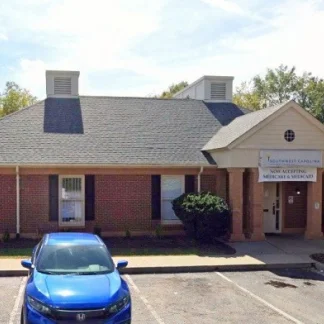Mentor
Mentor is a private rehab located in Anderson, South Carolina. Mentor specialize...
Carolina Treatment Center is an Opioid Treatment Program located in Anderson, South Carolina. Carolina Treatment Center provides medication-assisted treatment, combined with counseling and group therapy, to help opioid addicted individuals refrain from using illicit narcotics.
Contact us for more information: (864) 222-9798

Connect with Carolina Treatment Center by calling their admissions team directly.
(864) 222-9798 Website Get DirectionsThe Commission on Accreditation of Rehabilitation Facilities (CARF) is a non-profit organization that specifically accredits rehab organizations. Founded in 1966, CARF's, mission is to help service providers like rehab facilities maintain high standards of care.
CARF Accreditation: Yes
Research clearly demonstrates that recovery is far more successful and sustainable when loved ones like family members participate in rehab and substance abuse treatment. Genetic factors may be at play when it comes to drug and alcohol addiction, as well as mental health issues. Family dynamics often play a critical role in addiction triggers, and if properly educated, family members can be a strong source of support when it comes to rehabilitation.
Group therapy is any therapeutic work that happens in a group (not one-on-one). There are a number of different group therapy modalities, including support groups, experiential therapy, psycho-education, and more. Group therapy involves treatment as well as processing interaction between group members.
While medications can remove the “physical” symptoms of withdrawal, the emotional and psychological symptoms may continue. Counseling helps the dependent person develop skills and behaviors that help with the critical areas of recovery. Patients who fail to engage in treatment stand a considerably greater chance of relapse.
Group therapy is any therapeutic work that happens in a group (not one-on-one). There are a number of different group therapy modalities, including support groups, experiential therapy, psycho-education, and more. Group therapy involves treatment as well as processing interaction between group members.
While medications can remove the “physical” symptoms of withdrawal, the emotional and psychological symptoms may continue. Counseling helps the dependent person develop skills and behaviors that help with the critical areas of recovery. Patients who fail to engage in treatment stand a considerably greater chance of relapse.
While medications can remove the “physical” symptoms of withdrawal, the emotional and psychological symptoms may continue. Counseling helps the dependent person develop skills and behaviors that help with the critical areas of recovery. Patients who fail to engage in treatment stand a considerably greater chance of relapse.
Mentor is a private rehab located in Anderson, South Carolina. Mentor specialize...
SCVRD Anderson is a private rehab located in Anderson, South Carolina. SCVRD And...
Southwest Carolina Treatment Center specializes in treating opioid addiction, al...
Anderson – Oconee – Pickens Mental Health Center is a public rehab located in An...